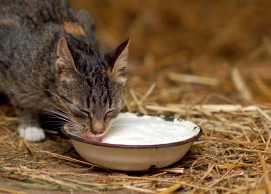I read a lot of blogs and books on real food, farming, nutrition, and so on. (Disclaimer: I am not a nutritionist or a farmer, just a food blogger and an eater of real food.) There is one recurring truthy, specious factoid out there that just won’t quit. (Vocabulary below.) That one persistent truthy, specious factoid is “humans are the only animal to drink milk from other species.”
Here’s the real fact: humans are the only animal that figured out how to obtain and store the milk of another species so that we could consume it on demand. Lots of other mammals would love to drink the milk of another species but have to rely either on extra-species largesse or on humans to get it. The proof is in the pictures.
Cats emulating bipeds:

Some serious interspecies sharing:

Even this (ewww):

Now here’s something you don’t see every day (unless you have a cat):
Scottie pinwheel dance for goats milk:
[youtube=http://www.youtube.com/watch?v=vDa0z0gEvI4&w=480]
As it happens, humans are the only species that pay to live on the Earth.
Vocabulary
specious (Google)
- Superficially plausible, but actually wrong: “a specious argument”.
- Misleading in appearance, esp. misleadingly attractive: “a specious appearance of novelty”. In other words, sounds true but it isn’t
truthiness
Coined by Stephen Colbert: the quality of knowing something in your gut, or your heart, as opposed to in your head.
From Merriam-Webster:
- “truth that comes from the gut, not books” (Stephen Colbert, Comedy Central’s “The Colbert Report,” October 2005)
- “the quality of preferring concepts or facts one wishes to be true, rather than concepts or facts known to be true” (American Dialect Society, January 2006)
factoid (Wikipedia)
A factoid is a questionable or spurious (unverified, false, or fabricated) statement presented as a fact, but with no veracity. The word can also be used to describe a particularly insignificant or novel fact, in the absence of much relevant context. The word is defined by the Compact Oxford English Dictionary as “an item of unreliable information that is repeated so often that it becomes accepted as fact”.

